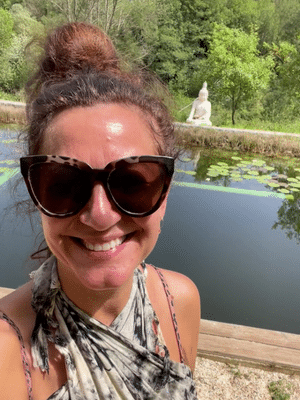This Is How To Invest In Your Career Dreams
TIME TO THRIVE BLOG
This Is How To Invest In Your Career Dreams

Investing in yourself is an integral component of unlocking your true potential. I know that you might think that prioritising yourself can be seen as ‘selfish’ or a ‘weakness’. I’ll show you how to use it as a strength that will propel you forward in your career.
Investing in myself
Recently, I left behind my overstuffed to-do list and my business duties, all to escape the Berlin winter for two glorious weeks at retreats in Portugal. Yes, TWO retreats, and even a solo beach day.
I immediately feel an urge to explain to you ‘we were working hard on those retreats, and it was not a ‘relax and recharge’ kind of retreat.’
It’s that part of me who is trying to prove to mummy that I’m worthy.
That old habit of needing to justify every moment of self-care. Yes, I’ve wrestled with that too. But today, I’ve learned to silence that voice and extend compassion to myself.
Because today, I know my worth. Today I know I must invest in myself and in my health to be a better therapist, coach, mother, wife and friend.
I understand that investing in myself isn’t just a luxury—it’s a necessity. It’s what allows me to show up as the best version of myself.
Building that self-care muscle is a game-changer.
There was a time in my previous corporate career when even the thought of asking for time off would keep me up at night, consumed by guilt and worry about what others might think.
Sounds familiar?
We need time off to get in touch with how we really feel and to make decisions that aligns with who we are.
I used to feel alone with my needs. I didn’t have a community of like-minded people to share with. I wasn’t sure how to take the first step to get clarity on my next career move. That all changed one day at a film studio in Stockholm.
My career journey
It’s easy to stay in a job you’ve worked so hard for. Thoughts like, “I’ll fall behind if I change careers” or “I’m too old to try something new”, can hold you back.
Believe me, I know these thoughts all too well. They tried to stop me too. But I made a decision not to let that inner saboteur compromise my happiness.
In my late 20s, after completing my studies, I found myself freelancing for Swedish state television. I had climbed my way up from making coffee for the actors and crew to the responsible role of second director assistant—a dream job for many.
I excelled at what I did. The actors and extras loved my friendly demeanour, and the director appreciated my organisational skills. But despite outward success, something within me felt unsettled—a persistent feeling of boredom and unfulfillment.
I ignored it and said yes to another film production.
Months passed, and if it hadn’t been for Marek, perhaps I’d still be stuck in the film industry.
One evening at an after-work event, Marek noticed the longing in my eyes and said, ‘Katarina, you don’t seem happy here. Why not travel, see the world, and try different jobs? You strike me as the adventurous type.’
Unknown to him, his words struck a chord deep within me. It was exactly how I felt, but I hadn’t dared to admit it to myself. After investing years in studying and landing one of the best jobs around, could I really just walk away?
A few months later I left Sweden in search of adventure and true fulfilment.
I invested in my well-being.
It took many detours before I landed in my dream job. I don’t want you to have to wait that long!
Reawaken Your Career Dreams
I’ve created something I wish I had had back in that film studio in Stockholm.
If you find yourself where I was, feeling like there’s more to life than your current circumstances, I’m here to help you avoid the mistakes I made and create a meaningful career—the simple way.
Introducing the FREE 4-week online course ‘Reawaken Your Career Dreams’ where you’ll be part of a community of extraordinary professionals like yourself, making the journey easier.
In this course, you will:
- Explore what truly matters to you in your professional life
- Identify your buried dreams
- Gain clarity on your next career move
You won’t just go from ambition to action; you’ll also finish this course empowered with the confidence to pursue what you truly desire.
The truth is, when you awaken your career dreams and gain clarity on your next move, you become unstoppable! I’ve witnessed hundreds of my clients do exactly that; they’ve stopped chasing someone else’s dream and chosen what they truly want!
You can stop stressing over work, running non-stop, and start doing what you really care about, experiencing more balance and freedom in your life.
Don’t let another day pass wishing for a career that brings you more fulfilment.
Click the button below and sign up today for the FREE 4-week online course ‘Reawaken Your Career Dreams’.
Hope to see you there!
Love,

Share this:

I’m Katarina
Welcome to my blog, where I share real-life stories and offer valuable and practical tips for how to achieve fulfillment without burning out.
By signing up to receive my journal, you agree to receive emails from me. You can opt out at any time.
Learn how to break free from overthinking to feel healthy, happy and confident – the easy way – with my free guided journal.
Learn how to break free from overthinking to feel healthy, happy and confident – the easy way – with my free guided journal.









